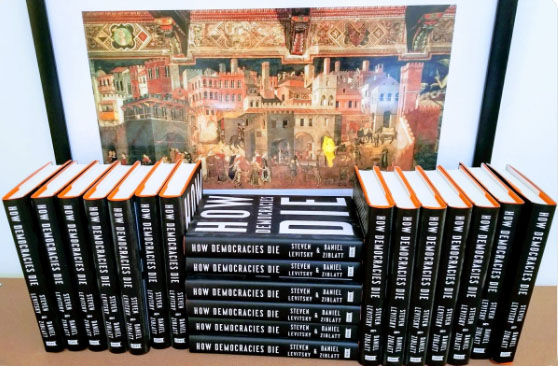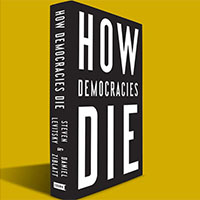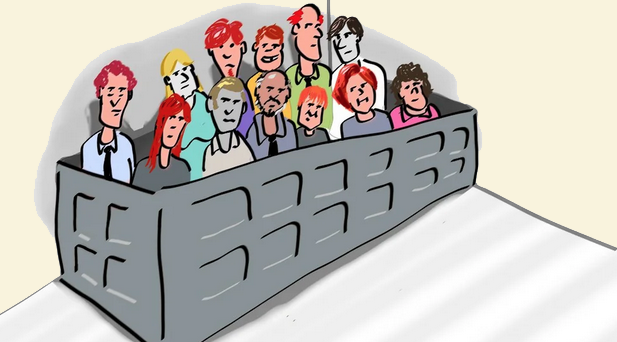— from Jens Kruse —

Steven Levitsky and Daniel Ziblatt are professors of government at Harvard University, who have been studying failures of democracy in Europe’s 1930s and Latin America’s 1970s for many years. But they open this book with a question they never thought they’d be asking; “Is our democracy in danger” (1)?
They try to reassure themselves: “Our Constitution, our national creed of freedom and equality, our historically robust middle class, and our large, diversified private sector – all of these should inoculate us from the kind of democratic breakdown that has occurred elsewhere”(1-2).
But they worry;
American politicians now treat their rivals as enemies, intimidate the free press, and threaten to reject the results of elections. They try to weaken the institutional buffers of our democracy, including the courts, intelligence services, and ethics offices. American states, which were once praised (…) as “laboratories of democracy,” are in danger of becoming laboratories of authoritarianism as those in power rewrite electoral rules, redraw constituencies, and even rescind voting rights to ensure that they do not lose. And in 2016, for the first time in U.S. history, a man with no experience in public office, little observable commitment to constitutional rights, and clear authoritarian tendencies was elected president.
What does all this mean? Are we living through the decline and fall of one of the world’s oldest and most successful democracies? (2)
In the next nine chapters of their timely and important book Levitsky and Ziblatt bring their extensive knowledge and experience of the processes of democratic failure, both historic and contemporary, to bear on their attempt to answer this urgent question.
But already in their “Introduction,” from which the above quotes are taken, they hint at what they develop in full in the body of their book:
- Since the end of the Cold War, most democratic breakdowns have been caused not by generals and soldiers but by elected governments themselves. (5)
- Institutions alone are not enough to rein in elected autocrats. Constitutions must be defended – by political parties and organized citizens, but also by democratic norms. Without robust norms constitutional checks and balances do not serve as the bulwarks of democracy we imagine them to be. (7)
- The tragic paradox of the electoral route to authoritarianism is that democracy’s assassins use the very institutions of democracy – gradually, subtly, and even legally – to kill it. (8)
The titles of the nine chapters outline the narrative and analysis that Levitsky and Ziblatt develop: “Fateful Alliances” (about what happens when traditional parties strike implicit bargains with authoritarian populists because they – foolishly and falsely – feel they can control them for their own purposes); “Gatekeeping in America” (about the necessity that parties serve as gatekeepers to prevent demagogues from running for office and their diminishing capacity to succeed as gatekeepers; “The Great Republican Abdication” (about how the Republican party utterly failed at keeping Donald J. Trump from getting the nomination and then in the general election not only failed to warn against him, but normalized him even though his authoritarian tendencies and his unfitness for the presidency became ever more clear); “Subverting Democracy” (about the various methods leaders and parties can use to undermine democracy); “The Guardrails of Democracy” (about the importance of democratic norms, unwritten rules, to support the more formal constitutional arrangements, particularly the norms of “mutual tolerance” and “institutional forbearance”); “The Unwritten Rules of American Politics” (in which the authors give a review of how these norms and unwritten rules have worked, or not, in our history); “The Unraveling” (in which the authors give a recent history of how these unwritten rules have increasingly been disregarded and broken, beginning with Newt Gingrich in 1978 and culminating in Mitch McConnells theft of a supreme court seat in early 2016); “Trump Against the Guardrails” (in which the authors trace Trump’s increasing assault against the guardrails and norms).
The ninth chapter is titled “Saving Democracy.” I will not try to characterize it with a parenthetical phrase; it is too crucially important for that. But I will leave you, dear reader, with two quotes from it:
Our constitutional system, while older and more robust than any in history, is vulnerable to the same pathologies that have killed democracy elsewhere. Ultimately, then, American democracy depends on us – the citizens of the United States. No single political leader can end a democracy; no single leader can rescue one, either. Democracy is a shared enterprise. Its fate depends on all of us. (230).
To save our democracy, Americans need to restore the basic norms that once protected it. But we must do more than that. We must extend those norms through the whole of a diverse society. We must make them truly inclusive. (…) Few societies in history have managed to be both multiracial and genuinely democratic. That is our challenge. It is also our opportunity. If we meet it, America will truly be exceptional. (231)
How Democracies Die (New York: Crown, 2018) can be checked out from the Orcas Library. It is available through Darvill’s Bookstore.
**If you are reading theOrcasonian for free, thank your fellow islanders. If you would like to support theOrcasonian CLICK HERE to set your modestly-priced, voluntary subscription. Otherwise, no worries; we’re happy to share with you.**









Sorry Mr. Levitsky & Mr. Ziblatt but the release of “How Democracies Die” is bad timing. I don’t even like the title. I’m not ready to read this book. Probably never will. I have great hope that what we are going through with this current administration is a nightmare and will soon end. Vote. Peace.
I’m glad to note that we don’t have a democracy.
We have a republic.
The difference is vast, and it’s important that we know what the difference is.
In a democracy, a simple majority, of even just one vote, decides every issue. It’s called “the tyranny of the majority.”
In a republic, mechanisms are in place which also allow the needs of the minority, sometimes a very large number of people, to be met, thereby (mostly) eliminating that “tyranny of the majority.”
I enjoyed reading it, but readily admit it is quite frightening. It’s a fast read and there are things for all of us to learn. And I agree with Steve on the Republic issue.
Conservatives love playing the ‘We’re a republican not a democracy’ card, I see it increasingly come up in conversations surrounding the direction our Country is going. It’s a completely pedantic point which entirely misses the spirit of the word ‘Democracy,’ and allows them to ignore the increasingly authoritarian and anti-democratic tone being taken by our Federal government. A tone that includes lavishing praise on dictatorships the world over.
The first two definitions of Democracy per Webster’s:
‘a : government by the people
b : a government in which the supreme power is vested in the people and exercised by them directly or indirectly through a system of representation usually involving periodically held free elections’
Both aptly describe a republic. By lobbing petty arguments addressing word definitions rather than the content of what is being discussed (i.e. our Country’s downward slope into cult of personality and fascism), you normalize the forces in our Country that wish to silence the voice of the people.
Hmmm….Wither ‘democracy’ or ‘republic’ or some unholy amalgalman of both, please do not assume that the current POTUS is an anomaly, a nightmare to be extinguished when we awake and things return to ‘normal’ There is no such thing as normal. This is the unintended lesson in our perilous and entertainment oriented moment.
America is predicated on hegemony not ‘democracy’ or ‘equality .’ If we want these things we will have to wage an active battle for them.
Henry, please don’t presume I’m a Conservative or a Republican. Just because a person believes the USA is more of a republic than a simple democracy (where majority rule is everything,) doesn’t make them a Conservative.
Call it what you want; republic or democracy. I grew up in a democracy. That’s what the textbooks called our nation; that’s what the newspapers and television called America. What I see happening with this administration is nothing short of the wholesale tearing down of our nation’s values and traditions. There is no leadership. Call it what you want……….
First of all, I did not say anyone was a conservative, I said that this word play diversion is a conservative talking point meant to distract from the issue at hand.
Secondly, I did not say America is not a republic. It most definitely is. But a republic is a form of a Democracy. So when a book such as the above talks about Democracy dying, it is not referring to literal Athenian style government in which every issue is voted on by every person(nor did that actually occur in Athens anyway). It refers to a political idea of the government’s power exuding from the people. So ignoring the context of what is meant, and instead repeating pedantic talking points only serves those in power who are working to consolidate their power.
Gosh, I never knew we had a democracy or a Republic. The First Nations people who were enslaved and slaughtered on their stolen lands never knew either, nor did the African American slaves, or most of the 99.9% under the thumbs of the banksters, corporatists, and bought-off government. Agree with Joe Murphy that if we want democracy we are going to have to fight for it and this downhill slide has been a long process of slowly boiling the frog alive in the pot.
It’s interesting, Henry: You’ve just adversely labelled two people whom you have never met, based solely upon on one purely factual statement.
You seem pretty good at long-distance conclusion jumping. Indeed, you’ve elevated it to the level of an Olympic sport.
I suggest that it’s a sport in which you might reconsider your participation.